模块1 Unit 1 School life Grammar and usage(2)_ Relative pronouns_that, which, who, whom and who课件(48张)
文档属性
| 名称 | 模块1 Unit 1 School life Grammar and usage(2)_ Relative pronouns_that, which, who, whom and who课件(48张) |  | |
| 格式 | zip | ||
| 文件大小 | 731.2KB | ||
| 资源类型 | 教案 | ||
| 版本资源 | 牛津译林版 | ||
| 科目 | 英语 | ||
| 更新时间 | 2019-07-21 16:37:41 | ||
图片预览

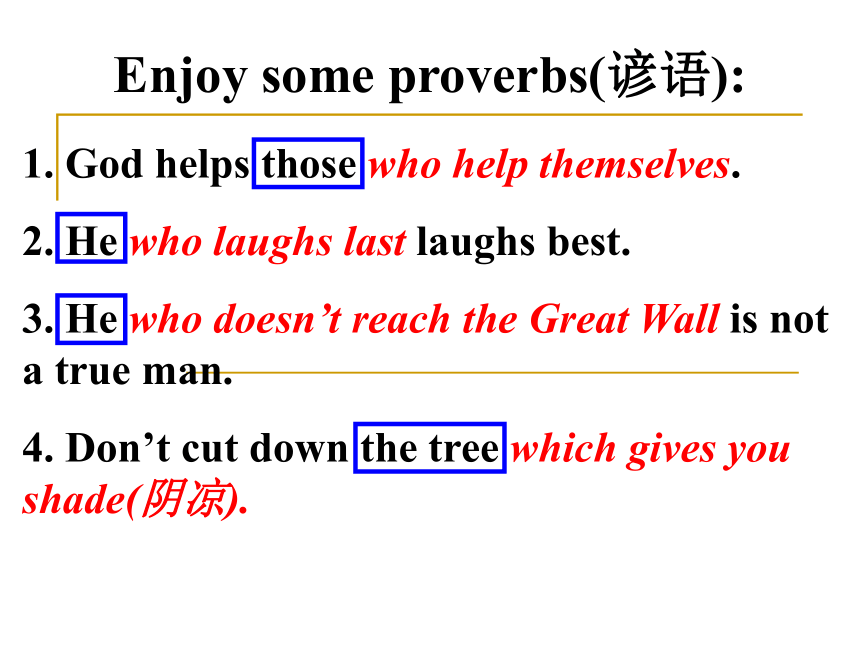
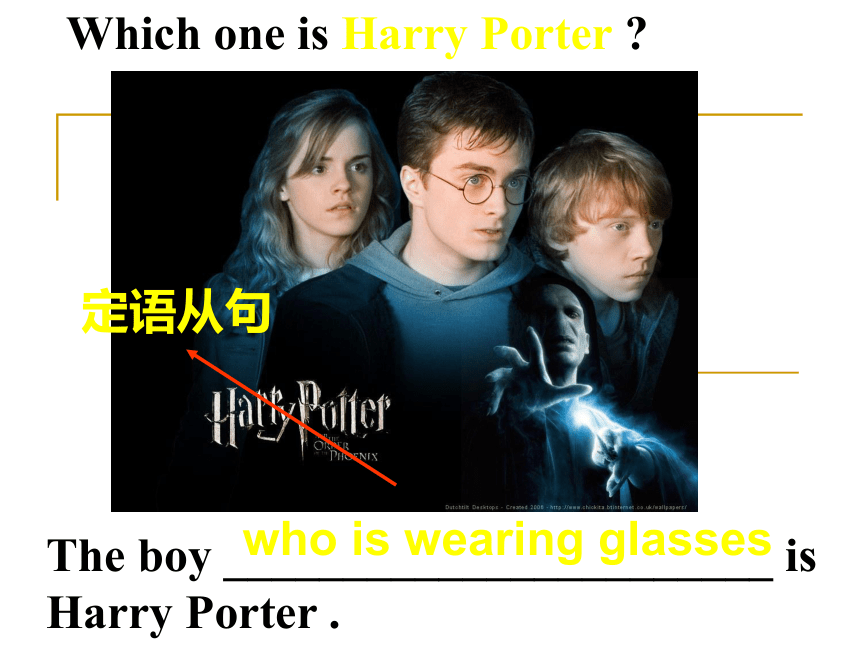
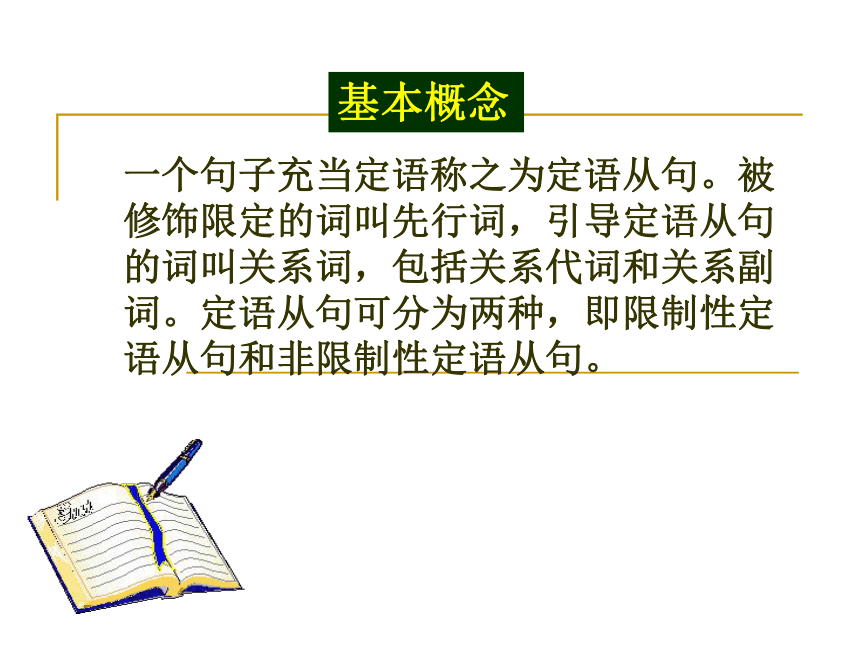


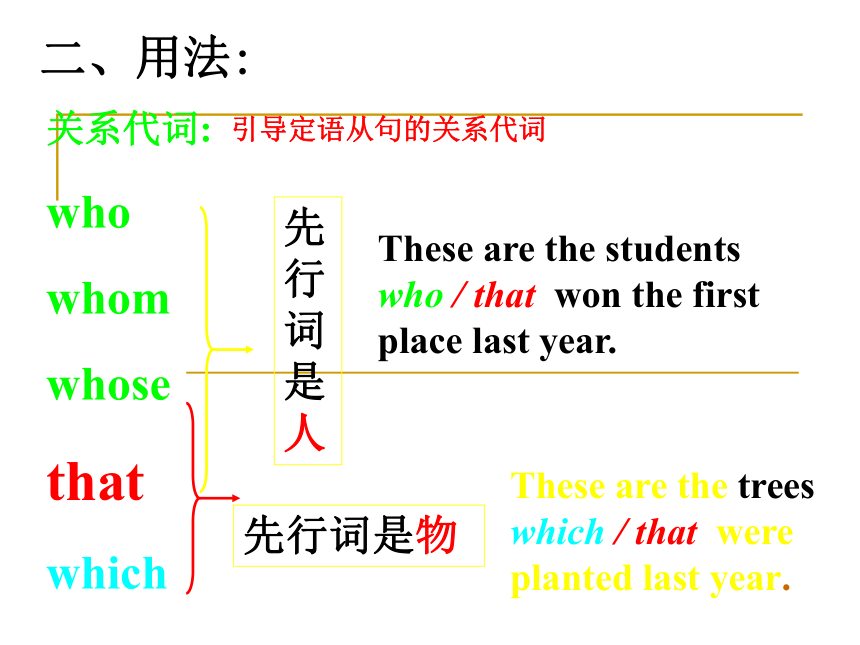


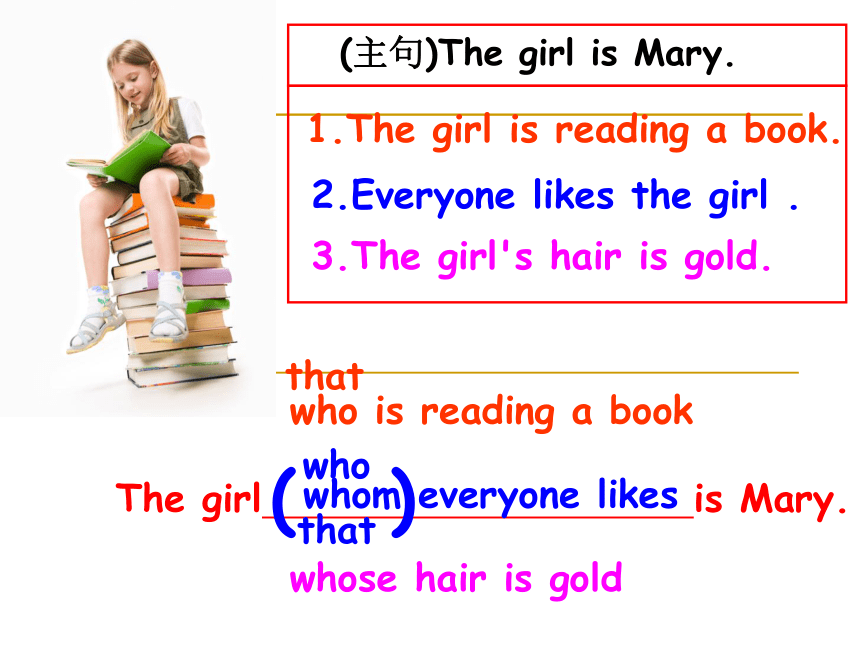
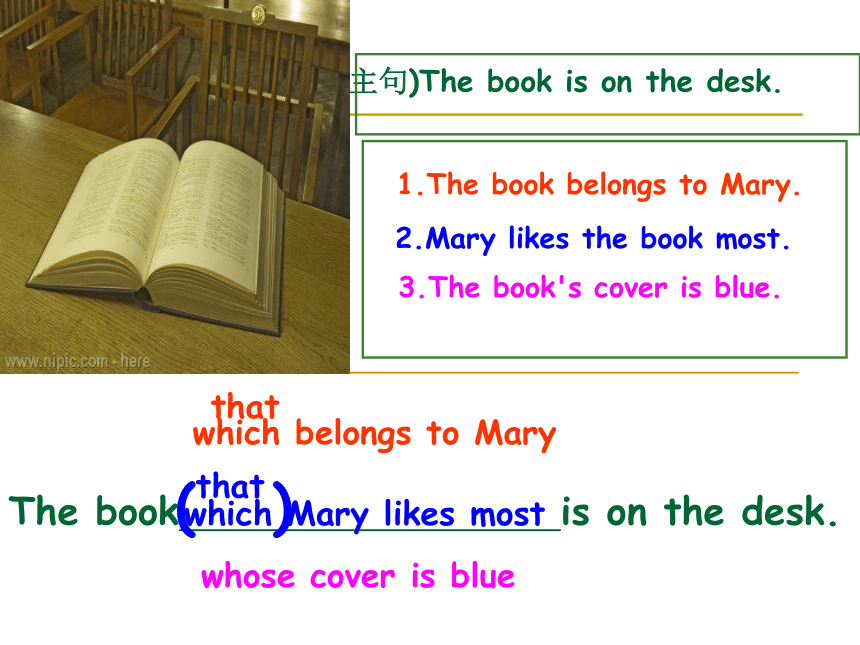
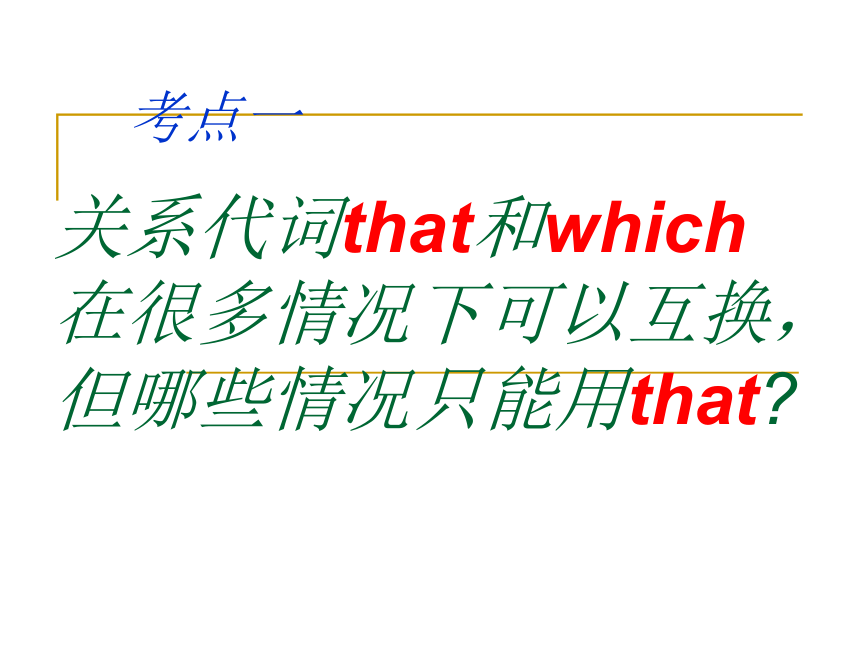
文档简介
课件48张PPT。Welcome to our class !Enjoy some proverbs(谚语):1. God helps those who help themselves.
2. He who laughs last laughs best.
3. He who doesn’t reach the Great Wall is not a true man.
4. Don’t cut down the tree which gives you shade(阴凉).Which one is Harry Porter ?The boy _______________________ is Harry Porter .who is wearing glasses一个句子充当定语称之为定语从句。被修饰限定的词叫先行词,引导定语从句的词叫关系词,包括关系代词和关系副词。定语从句可分为两种,即限制性定语从句和非限制性定语从句。
基本概念定语从句 The Attributive Clause名词/代词+关系词+句子God helps those who help themselves.Harry Porter is a boy who has magic power.先行词关系词定语从句which, who, whom, whose, that, aswhen where, ,why二、用法:These are the trees which / that were planted last year.先
行
词
是
人关系代词:
who
whom
whose
that
which先行词是物These are the students who / that won the first place last year.引导定语从句的关系代词8关系代词和关系副词的区别关系代词在定语从句中作主语、宾语、
表语、定语
关系副词在定语从句中作状语如何选用定语从句的关系词1.首先分清主句和定语从句
2.确定定语从句的先行词
3.把先行词带回到定语从句中去,看其在定语从句中做什么语法成分(主语,宾语,定语或状语)
4.若先行词在从句中做主语、宾语或定语则选择关系代词,若在从句中做状语,则选择关系副词。(主句)The girl is Mary.1.The girl is reading a book.2.Everyone likes the girl .The girl is Mary.who is reading a bookwhom everyone likes 3.The girl's hair is gold.whose hair is goldthatwhothat( ) (主句)The book is on the desk.1.The book belongs to Mary.2.Mary likes the book most.3.The book's cover is blue.The book is on the desk.which belongs to Marywhich Mary likes mostwhose cover is bluethatthat( )关系代词that和which在很多情况下可以互换,但哪些情况只能用that?考点一1.All that can be done has been done.
2.There is no difficulty that we can’t overcome.
3.This is the first letter that I’ve written in English.
4.This is the most exciting trip that I have ever experienced.
5.They talked about the teachers and the schools (that) they had visited.1)当先行词是不定代词时,如:all, few, everything, anything, nothing, much, little,none等。2)先行词前有no, all, few, little, the only, one of, every, very等词修饰时。3)先行词是序数词或被序数词first, last, next等修饰时。4)先行词是形容词的最高级或被形容词的最高级修饰时。5)当先行词既有人又有物时。
只用that不用which的情况: A)that B) which C)who D)whom E)省略多项选择
1.The terrible typhoon killed the people and cattle______ were in the fields.
2.The wind blew down the tallest tree _____ is in front of our school gate.
3.This is the very thing _____ I was looking for.
4.This is the second novel _____ I have ever read.
5.There is nothing in the world _____ can frighten me.
A AAEAAE有哪些情况关系代词不用that,而用which,who,whom?考点二1、在非限制性定语从句中,指事物用which,指人用who或whom.1.He made the same mistakes again ,______ made his parents very angry.
2.Yesterday I bought a dictionary,_______ cost me more than 100 yuan .
3.Mr. Smith,_______ gave a talk several months ago, will come again.
4.My uncle has come back from abroad,_______ I haven’t met for a long time.whichwhichwhowhomFill in the blanks1.Her bag, in _______she put all her money, has been stolen.
2.This is the ring on ________she spent 1000 dollars.
3.Xiao Wang, with ______I went to the concert, enjoyed himself very much.2、在介词后面,指事物用 which,指人用whom.whichwhichwhom如何用好whose 引导的定语从句?考点五whose表示所属关系The river _________ banks are covered with trees flows to the sea.whoseThere are in this class 20 students, ______ are different.
A.whose backgrounds
B.the backgrounds of whom
C.of whom the backgrounds
D.the backgrounds of whoseas 引导的限制性定语从句This is such an interesting book ____ we all like.
This is so interesting a book _____ we all like.
This is such an interesting book ____we all like it.
This is so interesting a book ____we all like it.asthatPlease complete the following sentences and compare:asthat这是大家都喜欢的如此有趣的一本书。(定语从句)这本书如此有趣,大家都喜欢。(结果状语从句)考点四
在定语从句中如何正确判断与使用介词?考点五1. The girl _____ whom he had fought all his life no longer seemed important to him.
2. He is the man _____ whom I think you can depend .
3. He referred to some reference books ______ which I am not very familiar.方法1.看定语从句中动词或形容词与介词的搭配foronwithFill in the blanks方法2.看从句中的动词或动词词组与先行词的搭配1.He made a hole in the wall, ________ which he could see what was going on outside the house.
2.The librarian _____whom I just shook hands works heart and soul.
through with方法3、根据先行词判断,所用的介词与先行词搭配1.The rate ______ which wild animals are being destroyed has increased.
2.This is our classroom ,_______________(在前面) which there is a teacher’s desk.atin the front of25when, where, why(二)引导定语从句的关系副词
1. This is the place where I was born.
2. I remember the day when I first met him.
3. Can you tell me the reason why you lied to me?关系副词When=on(in,during…)whichwhere=on(in,in front of…)whichWhy=for which(三)关系副词与介词+关系代词的替代28when when可用in/on/at/during +which 代替1.I still remember the day.
2.I first met him on the day.
I still remember the day on which
I first met him.whenwhich29where可用in/on/at/to + which代替
ABC
1.America is the country.
2.I was born in the country.America is the country in which I was born. whereBBCBeijing is the city in which I was born. where=American born Chinese=Beijing born Chinese30why why可用for +which 代替1.This is the reason.
2.I was late for school for this reason.
This is the reason for which I was
late for school. whywhich.Have you got it?由Who 引导的定语从句,在句中做主语 宾语1、Do you know the man ___ is talking with your father?
A. whose B. who C. which
2、The boys ___ the teacher talked to are from Class One.
A. when B. which C. who
3、Those ___ want to go to the museum must be at the school gate at 7 tomorrow morning.
A. who B. which C. whom选择题4. The gentleman ___ you told me yesterday proved to be a thief.
A. who B. about whom C. whom
5. The doctor ___ you are looking for is in the room.
A. whom B. what C. which
6. The teacher for ____ you are waiting has come.
A. who B. whom C. that由Whom 引导的定语从句,在句中做宾语7. A child ___ parents are dead is called an orphan.
A. which B. his C. whose 8. This book is for the students ___ native(本国的) language is not English.
A. that B. of whom C. whose
9. The boy ___ composition won the first prize is the youngest in the group.
A. who B. whose C. that
由Whose 引导的定语从句, 在句中做定语10、He prefers to eat the rice ___ in the south.
A. who is grown B. which is grown
C. when is grown
11、 The knife ___ I cut the apple with can’t be found.
A. which B. who C. what
12、The room in ___ there are many books is mine.
A. that B. who C. which
13、This is the pen ____ he bought yesterday.
A. which B. who C. when由Which 引导的定语从句,在句中做主语 宾语14. All _____ is needed is a supply of oil.
A. which B. that C. what
15. Finally, the thief handed everything ____ he had stolen to the police.
A. which B. what C. that先行词是不定代词 all, few, little, much, something, nothing, anything只能用that引导16. It’s the most boring film ___ I have ever seen.
A. which B. that C. whose
17. This is the first car ___ arrived this morning.
A. which B. who C. that 先行词被序数词或形容词最高级修饰时只能用that引导18. I know all people ___ are from that village.
A. who B. that C. whose
19. There is no water ___ is needed badly.
A. which B. who C. that
20. Please take any seat ___ is free.
A. which B. that C. in which先行词被all, any, every, few, little, no, some 等修饰时只能用that引导21. That is the very book ___ I was looking for.
A. who B. that C. which
22. After the fire in his house, the old car is the only thing ___ he owns.
A. who B. that C. which先行词被the only, the very, the same, the last 等修饰时只能用that引导23. The speaker spoke of some writers and some books ___ were popular then.
A. who B. that C. which先行词被既有人又有物时只能用that引导24. Who is the worker ___ took some pictures of the factory.
A. who B. that C. which主句已有who或which时,只能用that 引导填空题1. I have a friend ________ likes listening to classical music.who/thatwhich/thatwhose3. The man ______ leg broke in a
match used to be a football player.2. Yesterday Emily was wearing the
new dress __________ I gave her.4. My parents live in a house__________
is more than 100 years old.5. The boy with _______ John spoke is
my brother.which/thatwhom6. Kevin is reading a book __________
is too difficult for him.which/that7. Is there anything ________ you want
to buy in the town.8.All ______ we can do is to study hard.9. The first one _____ stands up is a
little boy.thatthatthat句子翻译1.这就是救了那个孩子命的医生.This is the doctor who saved the boy’s life.2.正在跑步的那个人是我的叔叔.The man who is running is my uncle.3. 我喜欢可以随之而唱的音乐. I like the music that I can sing along with.4. 住在隔壁的那个女的是一名教师. The woman who lives next door is a teacher.Homework
Find out in which situations can we use “when” and “where”.
Finish Exercise 1, 2 & 3 on P.29.
2. He who laughs last laughs best.
3. He who doesn’t reach the Great Wall is not a true man.
4. Don’t cut down the tree which gives you shade(阴凉).Which one is Harry Porter ?The boy _______________________ is Harry Porter .who is wearing glasses一个句子充当定语称之为定语从句。被修饰限定的词叫先行词,引导定语从句的词叫关系词,包括关系代词和关系副词。定语从句可分为两种,即限制性定语从句和非限制性定语从句。
基本概念定语从句 The Attributive Clause名词/代词+关系词+句子God helps those who help themselves.Harry Porter is a boy who has magic power.先行词关系词定语从句which, who, whom, whose, that, aswhen where, ,why二、用法:These are the trees which / that were planted last year.先
行
词
是
人关系代词:
who
whom
whose
that
which先行词是物These are the students who / that won the first place last year.引导定语从句的关系代词8关系代词和关系副词的区别关系代词在定语从句中作主语、宾语、
表语、定语
关系副词在定语从句中作状语如何选用定语从句的关系词1.首先分清主句和定语从句
2.确定定语从句的先行词
3.把先行词带回到定语从句中去,看其在定语从句中做什么语法成分(主语,宾语,定语或状语)
4.若先行词在从句中做主语、宾语或定语则选择关系代词,若在从句中做状语,则选择关系副词。(主句)The girl is Mary.1.The girl is reading a book.2.Everyone likes the girl .The girl is Mary.who is reading a bookwhom everyone likes 3.The girl's hair is gold.whose hair is goldthatwhothat( ) (主句)The book is on the desk.1.The book belongs to Mary.2.Mary likes the book most.3.The book's cover is blue.The book is on the desk.which belongs to Marywhich Mary likes mostwhose cover is bluethatthat( )关系代词that和which在很多情况下可以互换,但哪些情况只能用that?考点一1.All that can be done has been done.
2.There is no difficulty that we can’t overcome.
3.This is the first letter that I’ve written in English.
4.This is the most exciting trip that I have ever experienced.
5.They talked about the teachers and the schools (that) they had visited.1)当先行词是不定代词时,如:all, few, everything, anything, nothing, much, little,none等。2)先行词前有no, all, few, little, the only, one of, every, very等词修饰时。3)先行词是序数词或被序数词first, last, next等修饰时。4)先行词是形容词的最高级或被形容词的最高级修饰时。5)当先行词既有人又有物时。
只用that不用which的情况: A)that B) which C)who D)whom E)省略多项选择
1.The terrible typhoon killed the people and cattle______ were in the fields.
2.The wind blew down the tallest tree _____ is in front of our school gate.
3.This is the very thing _____ I was looking for.
4.This is the second novel _____ I have ever read.
5.There is nothing in the world _____ can frighten me.
A AAEAAE有哪些情况关系代词不用that,而用which,who,whom?考点二1、在非限制性定语从句中,指事物用which,指人用who或whom.1.He made the same mistakes again ,______ made his parents very angry.
2.Yesterday I bought a dictionary,_______ cost me more than 100 yuan .
3.Mr. Smith,_______ gave a talk several months ago, will come again.
4.My uncle has come back from abroad,_______ I haven’t met for a long time.whichwhichwhowhomFill in the blanks1.Her bag, in _______she put all her money, has been stolen.
2.This is the ring on ________she spent 1000 dollars.
3.Xiao Wang, with ______I went to the concert, enjoyed himself very much.2、在介词后面,指事物用 which,指人用whom.whichwhichwhom如何用好whose 引导的定语从句?考点五whose表示所属关系The river _________ banks are covered with trees flows to the sea.whoseThere are in this class 20 students, ______ are different.
A.whose backgrounds
B.the backgrounds of whom
C.of whom the backgrounds
D.the backgrounds of whoseas 引导的限制性定语从句This is such an interesting book ____ we all like.
This is so interesting a book _____ we all like.
This is such an interesting book ____we all like it.
This is so interesting a book ____we all like it.asthatPlease complete the following sentences and compare:asthat这是大家都喜欢的如此有趣的一本书。(定语从句)这本书如此有趣,大家都喜欢。(结果状语从句)考点四
在定语从句中如何正确判断与使用介词?考点五1. The girl _____ whom he had fought all his life no longer seemed important to him.
2. He is the man _____ whom I think you can depend .
3. He referred to some reference books ______ which I am not very familiar.方法1.看定语从句中动词或形容词与介词的搭配foronwithFill in the blanks方法2.看从句中的动词或动词词组与先行词的搭配1.He made a hole in the wall, ________ which he could see what was going on outside the house.
2.The librarian _____whom I just shook hands works heart and soul.
through with方法3、根据先行词判断,所用的介词与先行词搭配1.The rate ______ which wild animals are being destroyed has increased.
2.This is our classroom ,_______________(在前面) which there is a teacher’s desk.atin the front of25when, where, why(二)引导定语从句的关系副词
1. This is the place where I was born.
2. I remember the day when I first met him.
3. Can you tell me the reason why you lied to me?关系副词When=on(in,during…)whichwhere=on(in,in front of…)whichWhy=for which(三)关系副词与介词+关系代词的替代28when when可用in/on/at/during +which 代替1.I still remember the day.
2.I first met him on the day.
I still remember the day on which
I first met him.whenwhich29where可用in/on/at/to + which代替
ABC
1.America is the country.
2.I was born in the country.America is the country in which I was born. whereBBCBeijing is the city in which I was born. where=American born Chinese=Beijing born Chinese30why why可用for +which 代替1.This is the reason.
2.I was late for school for this reason.
This is the reason for which I was
late for school. whywhich.Have you got it?由Who 引导的定语从句,在句中做主语 宾语1、Do you know the man ___ is talking with your father?
A. whose B. who C. which
2、The boys ___ the teacher talked to are from Class One.
A. when B. which C. who
3、Those ___ want to go to the museum must be at the school gate at 7 tomorrow morning.
A. who B. which C. whom选择题4. The gentleman ___ you told me yesterday proved to be a thief.
A. who B. about whom C. whom
5. The doctor ___ you are looking for is in the room.
A. whom B. what C. which
6. The teacher for ____ you are waiting has come.
A. who B. whom C. that由Whom 引导的定语从句,在句中做宾语7. A child ___ parents are dead is called an orphan.
A. which B. his C. whose 8. This book is for the students ___ native(本国的) language is not English.
A. that B. of whom C. whose
9. The boy ___ composition won the first prize is the youngest in the group.
A. who B. whose C. that
由Whose 引导的定语从句, 在句中做定语10、He prefers to eat the rice ___ in the south.
A. who is grown B. which is grown
C. when is grown
11、 The knife ___ I cut the apple with can’t be found.
A. which B. who C. what
12、The room in ___ there are many books is mine.
A. that B. who C. which
13、This is the pen ____ he bought yesterday.
A. which B. who C. when由Which 引导的定语从句,在句中做主语 宾语14. All _____ is needed is a supply of oil.
A. which B. that C. what
15. Finally, the thief handed everything ____ he had stolen to the police.
A. which B. what C. that先行词是不定代词 all, few, little, much, something, nothing, anything只能用that引导16. It’s the most boring film ___ I have ever seen.
A. which B. that C. whose
17. This is the first car ___ arrived this morning.
A. which B. who C. that 先行词被序数词或形容词最高级修饰时只能用that引导18. I know all people ___ are from that village.
A. who B. that C. whose
19. There is no water ___ is needed badly.
A. which B. who C. that
20. Please take any seat ___ is free.
A. which B. that C. in which先行词被all, any, every, few, little, no, some 等修饰时只能用that引导21. That is the very book ___ I was looking for.
A. who B. that C. which
22. After the fire in his house, the old car is the only thing ___ he owns.
A. who B. that C. which先行词被the only, the very, the same, the last 等修饰时只能用that引导23. The speaker spoke of some writers and some books ___ were popular then.
A. who B. that C. which先行词被既有人又有物时只能用that引导24. Who is the worker ___ took some pictures of the factory.
A. who B. that C. which主句已有who或which时,只能用that 引导填空题1. I have a friend ________ likes listening to classical music.who/thatwhich/thatwhose3. The man ______ leg broke in a
match used to be a football player.2. Yesterday Emily was wearing the
new dress __________ I gave her.4. My parents live in a house__________
is more than 100 years old.5. The boy with _______ John spoke is
my brother.which/thatwhom6. Kevin is reading a book __________
is too difficult for him.which/that7. Is there anything ________ you want
to buy in the town.8.All ______ we can do is to study hard.9. The first one _____ stands up is a
little boy.thatthatthat句子翻译1.这就是救了那个孩子命的医生.This is the doctor who saved the boy’s life.2.正在跑步的那个人是我的叔叔.The man who is running is my uncle.3. 我喜欢可以随之而唱的音乐. I like the music that I can sing along with.4. 住在隔壁的那个女的是一名教师. The woman who lives next door is a teacher.Homework
Find out in which situations can we use “when” and “where”.
Finish Exercise 1, 2 & 3 on P.29.
